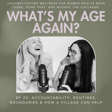Introduction to the Podcast
00:00:00
Speaker
Welcome to What's My Age Again, the realest podcast for women who are done chasing trends and ready to feel empowered. Hi, I'm Kim. And I'm Tanya, holistic nutritionists and childhood best friends who've been there, done that, and bought the collagen.
00:00:16
Speaker
more than once. Each week we provide actionable steps that you can start today to help you thrive through every decade to come. We're cutting through the wellness noise to bring you honest conversations about aging, hormones, health, beauty, mindset, and everything in between.
00:00:33
Speaker
You see, we're also on a mission to age gracefully one WTF moment at a time, backed by research and real life. We're here to share what actually works, what's a waste of time, and how to truly thrive through the messy, magical midlife transition.
00:00:49
Speaker
We're so happy you're here. Let's dive in.
Embracing Summer and Local Produce
00:00:53
Speaker
Hey, everybody. Hey, Kim. What is up? How are you? Hi, good morning. Happy summer. I hope everybody is in, well, for those of you listening in the summer at the time of this recording, it is summer. and It is summer and it is glorious. I am literally in my glory.
00:01:10
Speaker
um You know that obviously we grew up in Southern Ontario and now I am in like the foothills of Alberta. And for a summer girl, the summer is short here. I love it here.
00:01:21
Speaker
So no regrets there, but it is a short summer So I am in my glory right now. Everything is in bloom. And when it comes to food, which obviously we're going to be talking about today, it's a short growing season, no matter kind of where we are in Canada.
The Joy and Benefits of Home Gardening
00:01:40
Speaker
So we need to embrace the bounty that is local produce right now. Yeah. Absolutely. And it's one, of it's my favorite time of year, starting in the spring, ending with fall harvest.
00:01:54
Speaker
Our local farmers markets are open. i am Tanya, you've known me forever. i have never been agree tom but a but patio garden and front garden is getting better every year.
00:02:07
Speaker
and so I'm in my own growing season at my house. My kids are getting involved. It's yes, it's wonderful. and I love that. And I love too, that there can be a garden for every single space, right?
00:02:19
Speaker
I know where you are, you don't necessarily, where you are is stunning, FYI, and amazing weather for growing, but you don't necessarily have this big flat patch of land to grow, but you are making growth and a home garden in containers. We can do a home garden and anywhere.
00:02:35
Speaker
Exactly. Right? I'm about to in my condos. Exactly. Even indoors. A thousand percent. And for me, yes. And I'm learning that too, because um here I'm in like a zone two.
00:02:50
Speaker
Like I still, I feel like in where we live in the foothills, like right, you know, at the base of the Rockies, The only guaranteed month that you're not really going to have snow is generally August. Like last Canada day, like not snow where we're shoveling, but like last Canada day, snow did fall. And I was like, all right. So even with a limited growing season, what we can do, I know.
00:03:13
Speaker
And I, I know, I know. Um, I can still grow inside. So like, we really want to get to the nitty gritty today and talk about the positives, the absolute amazing things about eating local,
00:03:28
Speaker
Not only in terms of like the nutritional impact that it has on us, but bang for the buck budget. And then we just also want to kind of share like what we do in terms of right growing and buying local and how we kind of sustain that over what feels like where I live eternal winter, right?
00:03:46
Speaker
How do I stretch these two months for the eternal winter? Exactly. um So yes, so in terms of eating local, absolutely, it has a massive nutritional impact on our health.
00:03:59
Speaker
It's huge. And one of the main reason is that and it's such a short time from harvest to our plates. That's one of the main reasons. So for example, when we're purchasing things that have to come on a plane from a different side of the world, yeah,
00:04:17
Speaker
every day, every hour, every second that it's no longer in that ground again, it's starting its decaying process where it's losing its nutrient
Local Produce vs Imported Produce: Nutritional Insights
00:04:25
Speaker
value. yeah And by the time it gets to our plate, it's not as nutrient dense, doesn't have as many nutrients there as it did the day it was picked.
00:04:33
Speaker
And so literally when we have our garden on our patio we're picking those greens or whatever it may be putting it on our plate and it's still full of those nutrients where when it just came out of soil and same with our local farmers it's close it's able to be picked and then less time to be put on our plate that's one and if I can add to that exactly everything you said but also with that travel on planes, trains, automobiles, all of these things, um these the produce that's coming over here, it's also not being picked when it's ripe.
00:05:10
Speaker
So there's another problem right there, right from the get-go, it is being harvested before it is ripe. It is ripening in dark containers as it's transporting. And as you just said, it's also losing nutrients.
The Benefits of Local Honey
00:05:22
Speaker
So it didn't have the nutrient base to start with, and then it's losing more nutrients. And like my clients know,
00:05:28
Speaker
who My friends and family know as well. I like to talk about, even though i am so bad in math, Kim, you know this growing up with me, No math for me, but I always like to talk about nutrients in the form of bank accounts.
00:05:41
Speaker
And we have a bank account for every single nutrient the body needs. Phytonutrients you might not even know exist. Your macros, all of that stuff. And we eat so we can fill those nutrient banks.
00:05:55
Speaker
Because each bank account doesn't care if it's empty. If you are getting putting $100 in an account every day and $100 is taken out to pay a bill, you're basically running on empty.
00:06:06
Speaker
And that's a dangerous place to be. And if you're an overdraft in your accounts, well, your body doesn't have the tools, what it needs. Your bills aren't being paid. So we want the bang for our buck. We want our nutrient banks to be like bursting at the seams and And that's where that local piece comes in. Right. As you said, the the nutrient loss, it's not ideal.
Navigating the Cost of Organic Food
00:06:29
Speaker
That's a great analogy, Tanya. Isn't so weird that like the least Matthew person ever, but that's how I just make it's understandable to me. So yeah, we need to keep our bank accounts abundant and local is like you said, the way to go.
00:06:45
Speaker
Another interesting point too, like when it comes to, for example, allergies, Yeah. Buying local honey, for example, those bees. And if it's if it's local, we'll be getting pollen from our local plants.
00:07:02
Speaker
And then but we were ingesting that. So they're scientifically shown to reduce allergies. So that can also be a nutritional benefit as well. Good point. Like that is absolutely, i didn't even think about that.
00:07:17
Speaker
So we fill our banks, but let's talk about banks, real banks or real bank accounts or food is expensive, no matter where we are living.
00:07:28
Speaker
Like that is a struggle for, I think a lot of us in the The rising cost of food and then above that, the fact that we all know that we're paying more for food that doesn't have poison on it, right?
Farmers Markets and Seasonal Buying
00:07:43
Speaker
doesn The cost of things that are certified organic. it's It's astronomical. So there's a good thing actually, Tanya, to your point. Yeah. A course that I took with Megan Telpner once, she once said, and it's so true, like, why do we call, why do we have to create a new name for organic tomatoes? Why aren't the organic tomatoes just tomatoes?
00:08:06
Speaker
And the chemically processed tomatoes, which we call tomatoes, we should call them chemically processed. Processed. A thousand percent. And yeah ah for sure. So we know too, like food is astronomical. So I don't know about you, Kim, like, but in the summer months, like farmers markets are like a godsend. you know what I mean? Like it's something that, and here in like the greater Calgary area, there are year round farmers markets indoor.
00:08:39
Speaker
Is that a thing too, where you are? Like is there year-round indoor ones? there Well, we have a longer growing season as well. Yeah, rub it in, Kim. I know. Nice and warm there. And there's also co-op programs and things where you can purchase from local farms, get like a sort of subscription service.
00:08:58
Speaker
There's lots of different ways. There's also companies that sell produce that the grocery stores just don't want anymore because they've, they're imperfect.
00:09:09
Speaker
Yeah. Yeah. There's different ways that you can get your produce. Okay. So even year round, so we can talk about farmer's markets year round, but I think me and you can both agree visiting the farmer's markets now in season.
00:09:22
Speaker
there's It's so much more abundant than it is during those winter months. And we feel like we want to be in those farmers markets more because now they're outdoors. And it's like a thing you can do with your family or just like you do it on a Saturday morning or whatever, right?
00:09:36
Speaker
No, absolutely. And like you said, you know, I think something that I speak to people about all the time is that when we want to eat better, it seems that it costs more.
00:09:48
Speaker
When we're taking a look at the ingredients in our food, we want to eat whole foods, we want to eat organic, we want to um increase the amount of produce and fresh organic produce we purchase, it adds to our grocery bill.
00:10:01
Speaker
So yes, taking advantage of these months when we have our local farmers there. also one thing that I like to do, for example, with berries,
00:10:14
Speaker
If you can find a local organic berry farm near you, purchasing a lot of berries in season and then freezing them or using them you know to be used in the winter months can also be good. If you have the space and freezer space to do so, sort of stockpiling and saving food is a great way to be economical throughout the year as well because I use berries almost every day for smoothies.
00:10:41
Speaker
And so if I yeah stop having them in the summer, getting them from a good deal, getting them like fresh and in season, that's something that can help you through those winter months too.
00:10:55
Speaker
So much as to that. So two things I want to speak on that for is a, let's just talk about the fact that we just talked about losing nutrients. We have to remember when we are flash freezing something, when they are at their freshest, we retain the nutrients.
00:11:09
Speaker
So The fact that, you know what I mean, our strawberries that were freezing from these months, we're having a few months later, they have been frozen at their most nutrient dense. So I do the same thing. And for me, Kim, I'm really big going through the different, exactly what is in season and local for me.
00:11:29
Speaker
Like ah we just kind of came off asparagus season and I did a whole food spotlight on my community on asparagus. And then I made crap ton of asparagus soup. So I'm a big soup person because i don't know. It's all your nutrients in one bowl. My husband's always like, who eats soup in the summer? And I'm like, I do.
00:11:48
Speaker
I eat soup whenever I can. And the same thing with tomatoes. I buy an abundance of tomatoes and then I just core them and I flash freeze them as well. And I will have months worth of tomatoes to make a tomato bisque. One of my favorite things. And it's so easy. It's ready. And you just,
Local vs Organic: Understanding Farming Practices
00:12:07
Speaker
you throw it in. So again, we are hitting both things here. We are getting produce all through the later months that are high in nutrients.
00:12:16
Speaker
And then we're following that budget. It's, you know, helping our bank account as well. And one thing that I wanted to touch on that you just brought up is mother nature tends to give us what we need in season two.
00:12:30
Speaker
And that's not for this podcast. We can talk about eating seasonal eating and another podcast, but you know, there's a reason that mother nature gives us berries in the summer because it's like lighter, fresher, cooler foods.
00:12:43
Speaker
Then as we get into our harvest, we're getting into our squashes, you know, things that are more hearty and, um, Like you mentioned, making soups for the winter, warming foods. So yeah it is really interesting when we talk about eating seasonally.
00:13:00
Speaker
Absolutely. but for sure i Also for what mother nature wants to give us. Yeah. Like nature knows. So I want to talk a little bit about, um' growing. So eating local, yeah, can be in terms of our farmer's market and what's in season.
00:13:14
Speaker
But I want to talk about home gardens. But before we do, Kim, can we circle back for a sec? Because I think we're missing something here. We keep using the word organic, organic, organic. No shocker, we need a lot of shows about organic and pesticide. But what about addressing the question that often comes up?
00:13:33
Speaker
What's better shopping organic or shopping local? Like how do, how do we navigate that? I feel like that's a question that comes up a lot. And I think it's something we should talk about before we talk about our home gardens, right?
00:13:48
Speaker
It's a huge question and it's a great question too. And it's actually a question I've thought about as well, numerous times. And I think the answer is yes, of course, if you can find something local and organic,
00:14:01
Speaker
That is amazing. That's the best. but That's like a double win. That's a double win. But what we have to sometimes remember is the organic label is quite expensive to get.
00:14:13
Speaker
And so what matters most the farming practices of is the firming practices um of of the farm that you wish to buy the produce from.
00:14:25
Speaker
So you can, first of all, what I find at my local farmer's market is most of the people within the booths and the owners yeah absolutely are passionate about what they do.
00:14:36
Speaker
They love to answer your questions. um They live and believe it every day and they love questions. Or, you know, Tanya, you were saying, um, a quick Google search can also give you some great information. So kind of researching,
00:14:52
Speaker
about the company before you purchase is one way to find out. And what we mean by that is because some farmers don't necessarily have the organic certification, but they do use organic practices.
00:15:07
Speaker
Exactly. And the ah I am like, I am like a freaking detective. Okay. Like I will deep dive no ends. And I am also fun fact about me. If you really know me, I am also someone who is very socially awkward.
00:15:26
Speaker
I really do not love being like, hey there, farmer, can we talk about your practices? I know and I should say that I do. I do not. And if I can do stuff independently, I sure will.
00:15:39
Speaker
And when we deep dive, we find out that most of these companies, these are terms that we can be looking for. If we don't see certified organic, we want to look for things that are obviously non-GMO, which we probably all know is not genetically modified. So the seeds are pure.
00:15:55
Speaker
We want to look for things like pesticide-free, herbicide-free. And just like you said, Kim, the practices matter. So most of the time, what I'm finding out with these smaller companies are they're just, they're literally certified organic using organic farming practices and non-GMO seeds and practices without the certification.
00:16:17
Speaker
And some of those practices... It's super interesting when you when you learn more about these different farming practices because there's so much people can do without the needing the use of pesticides and herbicides.
00:16:32
Speaker
They can rotate their crops, planting crops together because when certain crops repel certain insects that want to eat other plants, so planting those together actually helps. um or they can add plants that attract um A certain type of insects that kill the pests that want to eat those plants. there's so There's a science and an art to farming.
00:16:59
Speaker
And there's different ways that our local farms can use um these practices rather than using pesticides or herbicides.
00:17:08
Speaker
Yes, you can ask them or a quick Google search can help as well. Yeah, for sure. And like, I think asking them would be great. And maybe that'll be a goal for my summer, not to be so awkward. But until then, like we can get the information. Or you can spend three hours like myself at meeting.
00:17:24
Speaker
um smart getting shock In a darkened room looking at your blue light on your cell phone instead of having a quick conversation with a human being. she But no, I love, yeah, Kim, we should do an episode all in itself for that.
00:17:38
Speaker
What you say is fascinating and like, yeah, but and I wanted to give an example too. Let's say, even on a local level can be a little bit broader than local, but Hero Greens.
00:17:49
Speaker
um I don't know how many of you guys out there have heard of Hero Greens. They do lettuces and they do microgreens. So I was visiting my mom in Ontario and she's like, oh, I got you some microgreens. My mom is bomb.
00:18:01
Speaker
Every time I go there, she has everything that I love to eat. But I was a little snotty McSnotterson. I was like, oh, thanks. And I looked at them and I was like, they don't say organic. They don't say anything. These greens are just going to be a chemical cocktail.
00:18:14
Speaker
But, well, first off, I ate them because i love my mom so much. But then I actually researched them. I buy Hero Greens all the time now. So they are a company that started in Guelph, Ontario doing local farming practices.
00:18:27
Speaker
And they figured out how to kind of spread across Canada because now they have these hydroponic growing farms in the hubs of cities. So like there's one in Calgary, there's one in Vancouver, there's one out east.
00:18:42
Speaker
So now we're getting these microgreens and they're not all coming from Ontario anymore. And like the example you said, Kim, they're using organic farming practices. They are as good as certified organic without
Exploring Sustainable Farming Techniques
00:18:54
Speaker
the certification. So for me, it was definitely a turning point in learning lesson to like, stop just looking for the certification and realize that there's a lot of things that can be going on behind the scenes, right? To make things just as clean.
00:19:08
Speaker
Absolutely. And hydroponics is a word that's coming up more and more as well as biodynamic farming. I'm not sure if any of you've heard those terms, but there are biodynamic farm farms popping up um everywhere. And this this is kind of back to an old way of farming where they rotate rotate crops and animals.
00:19:29
Speaker
um And it really, the focus is on the soil. Yeah. And like, it makes so much sense too. Sorry. I didn't mean to interrupt you. We talk about like all the time, soil being depleted. So like when we're like, we could eat, I'm like, you could eat like gold. You could eat all day, all these beautiful organic veggies. If the magnesium and isn't in the soil, girl, it's not in the plant.
00:19:56
Speaker
So, oh, Kim, can we do a whole episode about like hydroponics and like biodynamic farming? I honestly think that would be really relevant to like, what You know what I mean?
00:20:06
Speaker
What we're talking about here, just those nutrient banks. and yeah It's so interesting.
Involving Kids in Gardening
00:20:11
Speaker
Okay, so Tanya, before we move on, what should somebody be looking what should somebody be looking for Perfect. So I love it. like Thanks for asking, Kim.
00:20:22
Speaker
If it's not certified organic, like you said, the real winner is when we see something that's budget friendly, certified organic, and it's local. You are like, da-ding. It doesn't happen all the time though. It doesn't happen often.
00:20:34
Speaker
know So like you just said, certified organic. But if not, we're looking definitely for local, right? Like in our vicinity, but within that local, non-GMO,
00:20:47
Speaker
which should also be its own episode to be totally honest with you. um A lot of them say pesticide free, herbicide free. And Kim, I think I've seen stuff like, I haven't bought it because I haven't been able to research the brands, but like I've seen berries that say hydroponically growing on them.
00:21:10
Speaker
Like I've seen that before. Okay, perfect. Perfect. i think I think that gives people an understanding of where to start. And for those of you who haven't been to your farmer's markets, I encourage you to look them up, see where they are close to your neighborhood and visit them.
00:21:29
Speaker
Have it become part of your little weekly schedule. I know for me too, like as I'm bringing my kids to the farmer's market is kind of a fun, unique experience. I guess it's not unique for them anymore, but it can be, it's a really fun experience.
Starting Your Home Garden
00:21:44
Speaker
And I find too kids who choose their food or grow their food, I should say too, because I should tell you a quick story, Tanya. So literally my youngest would not have greens at one point years ago.
00:21:59
Speaker
I feel like that's probably common for a lot people listening. thing Like what kids want greens anyways? Lettuce, greens, no thank you. nothing However, when we, i this was me starting my little herb garden, that was where I started. yeah And we went and picked, actually we were also so meet um we were also growing tomatoes, grape tomatoes. So pick the tomatoes, pick the basil, and he enjoyed his tomato basil salad for dinner and was so proud because he had been the one to grow those plants.
00:22:31
Speaker
Right. And like, let's be honest, how old was he when this was happening? Oh gosh. He was probably like, I guess he would have been five, four, four. Like, I'm sorry. And yeah, I don't have kids, but you better believe, you know, I'm around kids. I'm good with kids.
00:22:47
Speaker
I just don't have my own. I don't know any kid that's like, this is an amazing tomato basil salad, right? So like there is a feeling and an energy about growing your own food and it's undeniable. And even for children who don't really understand what and that energy is, they're drawn to that. It's like a pride, like you grew it. And here's the thing too.
00:23:06
Speaker
When we are growing our food, we don't have to ask anybody about what's in it or Google it. If we know the seeds that we're getting, that's one thing I you know will say like, If you're getting those organic non GMO seeds, that's one thing that I would suggest.
00:23:23
Speaker
And you're buying that, you're buying the soil, the organic soil, like, you know, what you're spraying, what you're not spraying, hopefully what you're not spraying, don't spray guys. But like the point is that you are actually in control and there's like that good feeling to know your nutrient banks are being filled. And then there's also that energetic feeling as well that Brenny had, like we grew this, we picked it and put it in a bowl.
00:23:46
Speaker
Totally. And he may not eat that every day, but he will definitely try it. Right. It's just, it's just a oh ah really nice way to expose kids to different foods, different flavors, get them excited about trying it.
00:24:00
Speaker
And who knows, they may hate it. They may love it, but at least they're trying it and they're, and they're there for the experience. A thousand percent. So can I, yeah, Go ahead. No, what do you want to move on to? Maybe we want to move on to the same things. Tell me.
00:24:14
Speaker
I was just going to say one of the things that you mentioned at the beginning is talking about some tips and tricks or some things that you love from the farmer's market and maybe some like recipe ideas of what we can do.
00:24:27
Speaker
Yes. And before we do that, because we were definitely talking about different things, which is fine. Can we quickly just talk about in reference to your garden, because we have people at all different levels of thumbs. Kim, I know your thumb was not green, but look at you now.
00:24:41
Speaker
What did you start with? What are the easiest things that you're growing? I know we have all different areas, but what are you growing? What's a consistent in your herb garden here? Okay. The easiest things for me to grow were herbs.
00:24:53
Speaker
So I started with the basil and the chives. I didn't realize at the beginning that chives actually came up every year. I was surprised year two when my chives started growing again. That's exciting. That's a pleasant surprise. Okay. it's Very pleasant.
00:25:06
Speaker
This year I tried garlic and that's really, that's, um we plant garlic. you have garlic already? Well, you plant it in October and then it spends the winter under the ground and then it starts growing in the spring. Kim, it just became like not winter here. I feel like a month ago. So you like had yours like way earlier probably than I would, but like, that's so cool. Okay. Sorry. I'll put a picture it but out there. Yes.
00:25:29
Speaker
So but one of the easiest things that I started with to grow was kale and chard. They're expensive in the store as well. Yes. Right. And they grow in abundance and they're quite hardy for, so for people who do live in shorter growing seasons, yes it zone two no well they well into the fall and they just keep giving and giving and giving. So, you know, there's some things like, you know, you'll grow something and you'll enjoy it for one meal and you're so proud of it. And that doesn't matter, but it's like, okay, all this work.
00:26:02
Speaker
But the kale just keeps going and you give get an abundance of it. So that one was a good first start for me. Okay. That's perfect to know. And I'm going to be ah exactly, I'm in the zone too.
00:26:13
Speaker
So I can't grow a lot. Not that I'm, here's the thing for me. I'm very green thumbie, but like, I like my house plants and stuff. Like,
Seasonal Produce and Preservation Techniques
00:26:22
Speaker
I don't know. I don't necessarily know if I want to to tend with like bugs stuck on vegetables. I'm not buggy, but yeah.
00:26:30
Speaker
I agree with you with the lettuces, with the kales. That's something that gives abundance. And that's what I'm mainly doing. I do have a um ah basil as well, but lettuces and kales win, win. So if you guys are looking to start something, whether you have a plot or a pot, look at me. Good remedy good one, Tanya. Good one, Tanya, by accident.
00:26:49
Speaker
um Greens, kales and whatever. But yes, let's before we like sign off for the day, talk about what you were suggesting. What are my fines for like farmers market and in season like?
00:27:04
Speaker
So in season, as I mentioned, I will grab whatever veggies are in season and make soup. So asparagus, we just passed. Tomatoes are huge because it's a long season. So just like tomatoes, not only for tomato bisque, but for sauces. that's and Yeah. across the water Yes.
00:27:22
Speaker
Those pasta sauces. I haven't really gone on like making the salsa train or whatever, but anyways, tomatoes for me are one to grab Because they become expensive in the off season and you get like two bruised tomatoes. So like those ones and you know, another one, Kim, which I don't know the season here. I knew it in Southern Ontario. It's definitely coming. I think it's August, the end of August eggplant, because I literally slice up eggplant, like nobody's business and make like five trays of eggplant parm and just freeze them.
00:27:53
Speaker
And like that does me almost into the winter. So those are my biggies. I would like to learn more about doing like potentially, I'm not sure more with fruits.
00:28:05
Speaker
I'm more doing the veggies and enjoying the fruits, but like you said, you free strawberries for smoothies, but like, what else are you doing? What are your finds now at the farmer's market and what you're using? For sure. I, so about the strawberries or any berries for that matter. I love strawberries.
00:28:21
Speaker
to I love obviously to freeze them like I said for smoothies you can freeze them individually um also love to make jams and one of the things tell me about it and tell us about this I want to know well just like what we I don't know if I think this was in a previous episode and we talked about salad dressing but with With jams, jams are one thing that I feel like people don't really need to buy from the store.
00:28:47
Speaker
They're full of sugar. They're full of preservatives and they don't take long to make. Really, honestly. it's So basically, I'll take whatever berry. You can mix the berries.
00:29:00
Speaker
Like you can just boil it down a little bit on your stove. Yeah. Sometimes I put it in the Vitamix because my kids don't like a lumpy jam, but you don't need to. i add some chia seeds, maybe a little bit of sweetener, and then you can put them individually.
00:29:16
Speaker
um i have like a little silicone um ice cube tray where I freeze it and then pop them out and have it for individual servings. That is so smart. See, that is like kid smart, planning smart. Like, okay, I'm definitely going to do that. That is like, I never even thought about ice cube single servings. Like you could just put those all like a bag in the freezer and like you could have them for like even cooking and like baking sweet things, thumbprint cookies throughout the winter. Like, wow.
00:29:45
Speaker
Yeah. And I have not got into canning. So for those of you who are into canning, Yes. Go even more crazy, but that that's what I do right now. But yes, I will be into making preserves hopefully soon.
00:30:01
Speaker
I love it. And I love again, how you said like, and even the things that we're buying in the stores, we don't know. Has their fruit traveled? Like, do you know what I mean?
Engaging with Local Markets and Farmers
00:30:09
Speaker
So again, it goes back to the core of what we were talking about, this local extending it as much as we can for our nutrient banks, for our real banks, and for like that joy and energetic fulfillment of eating.
00:30:22
Speaker
So like guys, dead of summer. get out there, buy local, get creative, tell us about it. Show us what you're doing. Talk to your farmers. Talk to your farmers, Tania. Step one, Tania. Talk to your farmers and then tell us what you're doing with it. And I mean, send me tips on how to talk to the farmers and like, let's all share this. We want to see what you guys are doing. Like get out there and enjoy it while we can because it'll be winter soon enough.
00:30:50
Speaker
No, stop it. All right, everybody. Enjoy. Let us know how you do Send us your recipes. We love to hear from you and we'll talk to you soon. Until next week. Bye, guys. Bye.
00:31:03
Speaker
hey guys. Thanks so much for hanging out with us today. If this episode resonated with you, we would love it if you would hit like, subscribe to the podcast, and share it with a friend. We love to hear from you because let's be honest, this show is for you.
00:31:17
Speaker
If you have a topic you'd love us to tackle or want to learn more about something we talked about today, send us a message. We got you. Stay connected with us on social media at what's my age again dot podcast for even more knowledge and inspiration between episodes.
00:31:35
Speaker
Kim and I aren't doctors or your healthcare practitioners. Everyone's body is unique, so always consult your own healthcare care provider before starting something new.




















